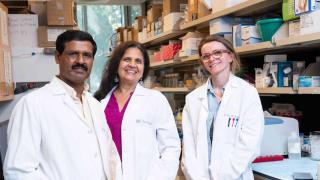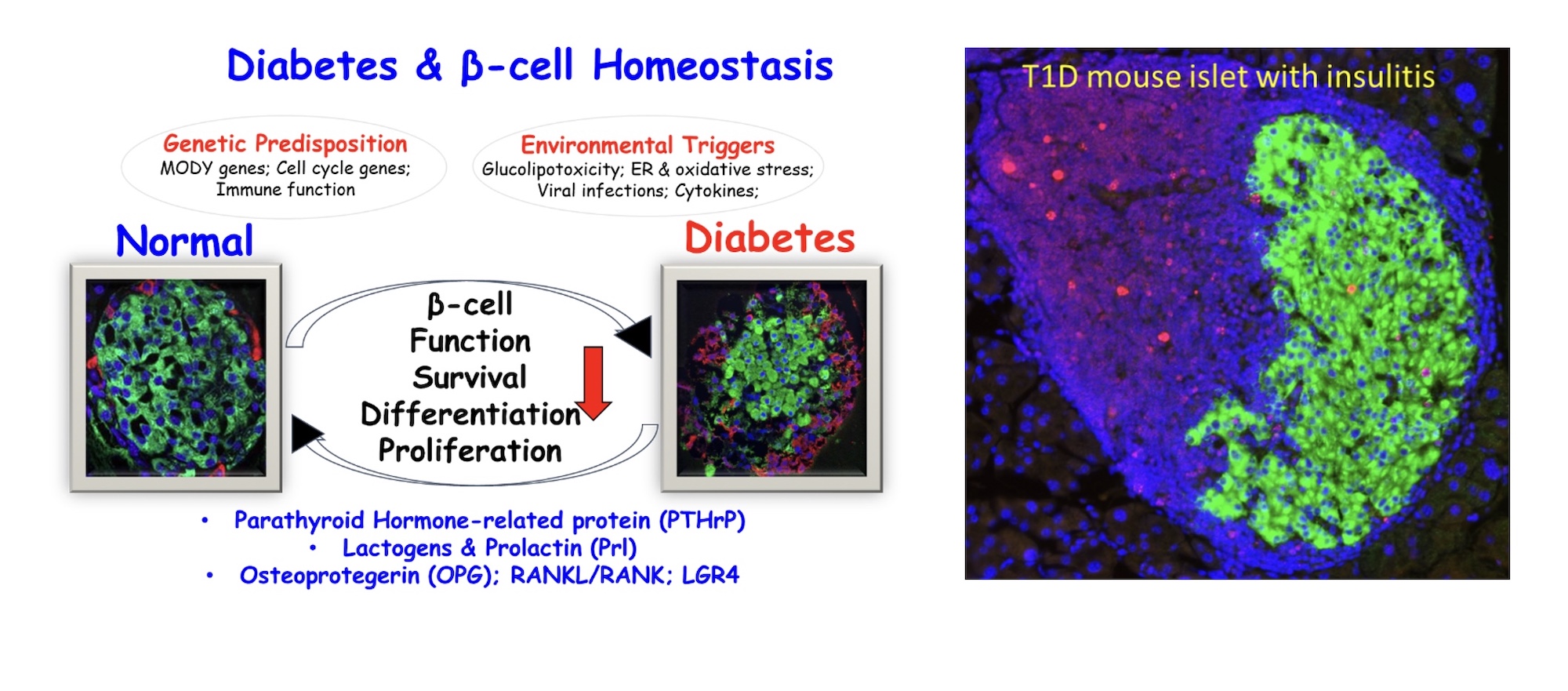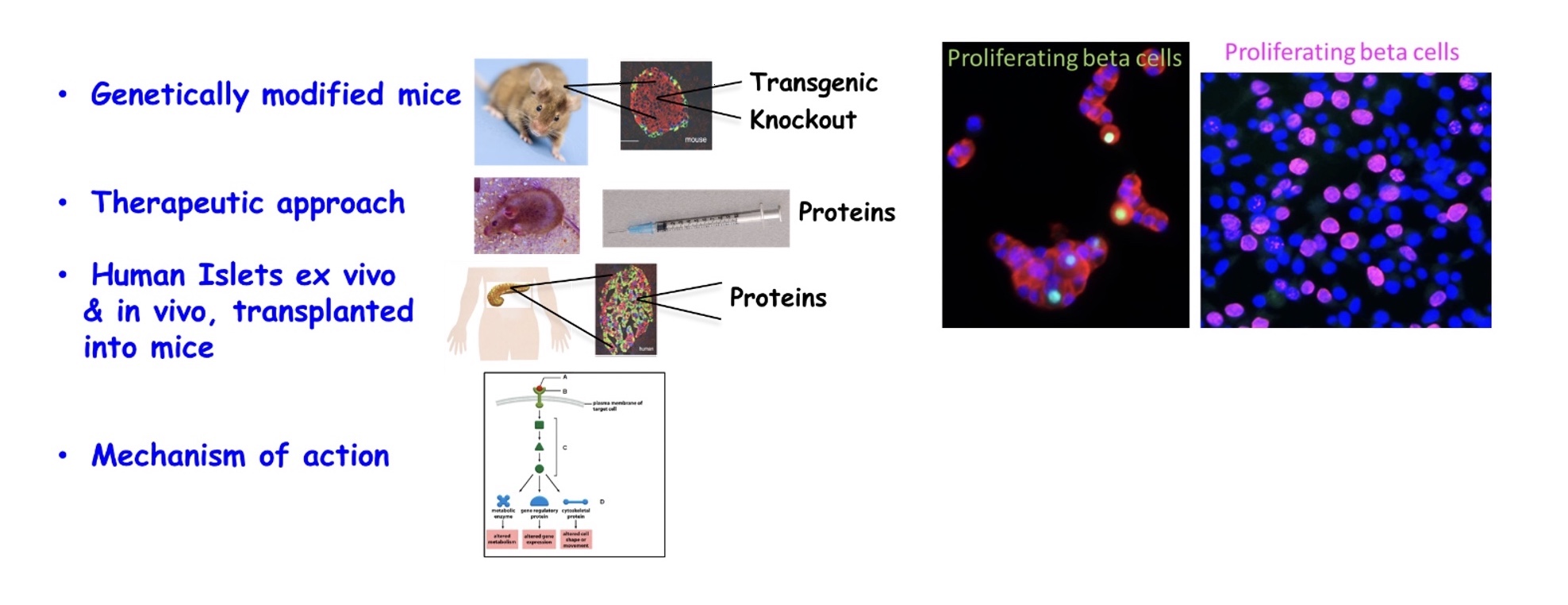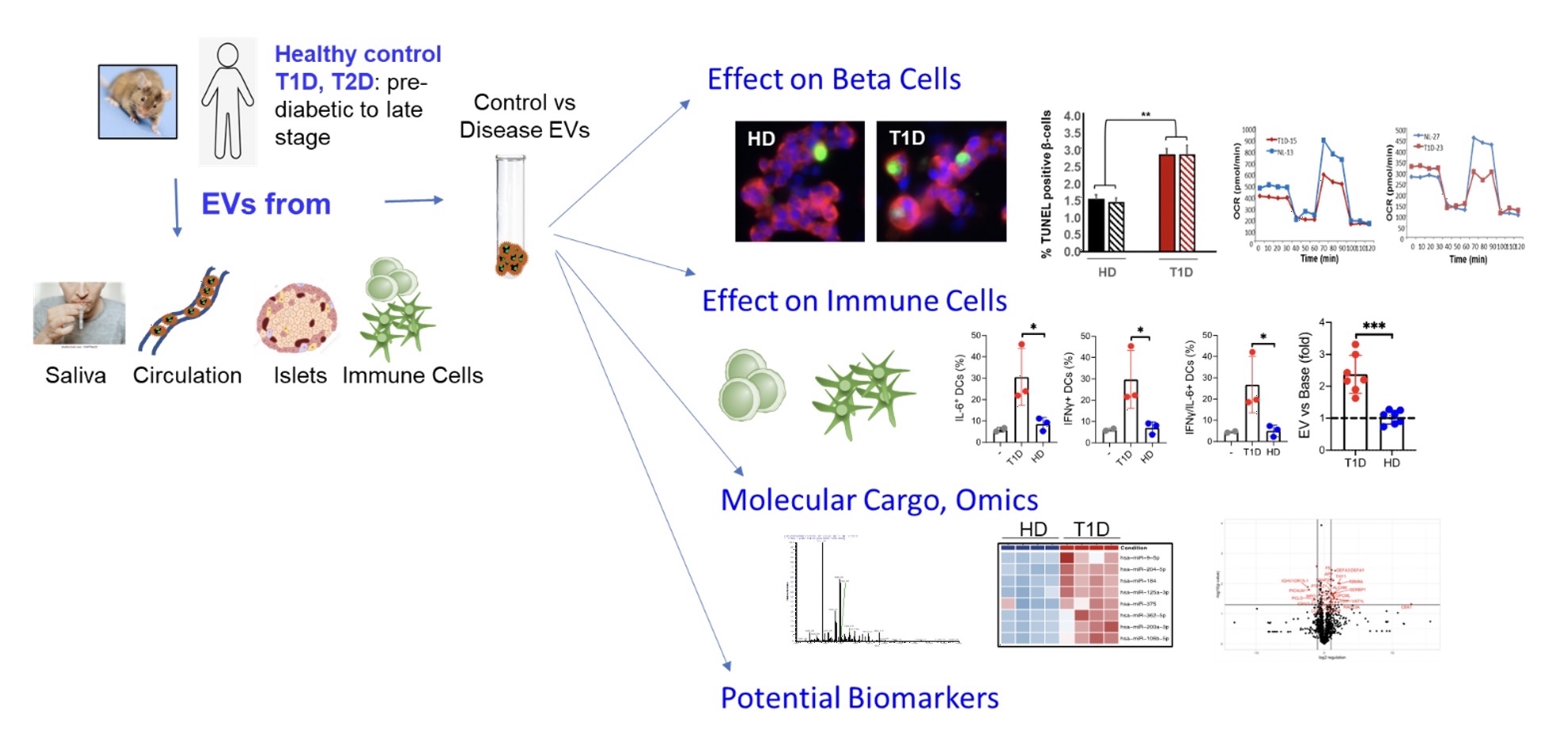
Rupangi Vasavada Lab
Enhance growth, survival, and function of pancreatic beta cells
Loss of functional pancreatic beta cells is the common cause of both type 1 (T1D) and type 2 diabetes (T2D). Our research has identified protein factors and signaling pathways (PTHrP, lactogens, OPG, RANKL/RANK and LGR4) that improve diabetes outcomes in mouse models and improve beta cell health in human islets from diabetic individuals. We use a multipronged approach to test our hypothesis. Through this approach we have discovered that an immune and bone-related pathway regulates beta cell health, leading us to test the potential of repurposing an osteoporosis drug for treating diabetes.

Approach

Role of extracellular vesicles (EVs) in the pathophysiology of diabetes
Our recent findings on plasma-derived circulating EVs as well as tissue-derived EVs implicate a role in the pathogenesis of T1D. We are currently examining the potential of EVs as functional and molecular biomarkers in the pathogenesis of T1D and eventually T2D.
This is being pursued with funding from the National Institutes of Health in collaboration with labs at City of Hope and elsewhere.

Rupangi Vasavada, Ph.D., is an associate professor in the Department of Translational Research & Cellular Therapeutics. Prior to joining City of Hope, Dr. Vasavada was at the Icahn School of Medicine at Mount Sinai in New York, and before that, at University of Pittsburgh in Pennsylvania. She received her Ph.D. in molecular biology from University of Pennsylvania and her Bachelor and Master of Science in zoology and endocrinology from Delhi University in India.



Nagesha Guthalu Kondegowda, Ph.D., is a Research Assistant Professor in the laboratory of Dr. Vasavada. Dr. Kondegowda pursued his Ph.D., at Central Food Technological Research Institute, Mysore, India. In Dr. Vasavada’s lab, he has focused on multiple research projects. He has discovered novel roles for PTHrP, lactogens, OPG and the RANKL/RANK pathway in the regulation of beta cell health in normal physiology and in the setting of T1D and T2D. This has led to the issuance of two US patents with Dr. Vasavada on the role of OPG in T1D. Recent work from Dr. Kondegowda led to the exciting discovery that extracellular vesicles (EVs) have potential as functional and molecular biomarkers in diabetes pathology.


Joanna’s graduate training was in the areas of bone biology and mesenchymal stem cells. She graduated from the Jagiellonian University Medical College in Poland with a PhD degree in medical biology. She is currently a postdoctoral fellow in the laboratory of Dr. Rupangi Vasavada, located in Arthur Riggs Diabetes and Metabolism Research Institute, at City of Hope, in Duarte, California. Joanna’s postdoctoral training is in islet biology and diabetes. In 2019 she was awarded a three-year postdoctoral fellowship sponsored by the Juvenile Diabetes Research Foundation (JDRF), entitled: “LGR4, a novel receptor for RANKL: role in Type 1 diabetes”, to study the role of G Protein-Coupled Receptor LGR4 in the pancreatic β-cell. Joanna is testing her hypothesis that the membrane-bound LGR4 receptor and its soluble form (LGR4-ECD) regulate β-cell health, proliferation, and survival. She uses rodent and human islet cell cultures as well as tissue-specific conditional knockout mouse models to test her hypothesis.
Filipowska J, Kondegowda NG, Leon-Rivera N, Dhawan S, Vasavada RC
Jimenez-Gonzalez M, Li R, Pomeranz LE, Alvarsson A, Marongiu R, Hampton RF, Kaplitt MG, Vasavada RC, Schwartz GJ, Stanley SA
Li R, Kondegowda NG, Filipowska J, Hampton RF, Leblanc S, Garcia-Ocana A, Vasavada RC
Sacaan AI, Thibault S, Hong M, Kondegowda NK, Nichols T, Li R, Rosselot C, Evering W, Fenutria R, Vitsky A, Brown T, Finkelstein M, Garcia-Ocaña A, Khan N, Stewart AF, Vasavada RC
Mozar A, Lin H, Williams K, Chin C, Nagesha Guthalu NK, Stewart AF, Garcia-Ocana A, Vasavada RC
- Rupangi C. Vasavada and Nagesha G. Kondegowda are inventors on two U.S. utility patents, No. 9333239, issued on 5/10/2016, and No. 9724386, issued on 8/8/2017, for “Use of Osteoprotegerin (OPG) to increase human pancreatic beta cell survival and proliferation”.
- A preview article “Felizitas Schmitz, Sara Roscioni, and Heiko Lickert. Repurposing an Osteoporosis Drug for β Cell Regeneration in Diabetic Patients. Cell Metabolism Previews. 22: 1-2, July 7, 2015.” was published highlighting the findings from our study published in the same issue of Cell Metabolism.
- Guthalu NK, Fenutria R, Pollack I, Orthofer M, Garcia-Ocaña A, Penninger J, Vasavada RC. Osteoprotegerin and Denosumab stimulate human beta cell proliferation through inhibition of the Receptor Activator of NF-κB Ligand (RANKL) pathway. Cell Metabolism 22:77-85 (2015). PMID: 26094891
34.1293409, -117.971358
Duarte, CA 91010